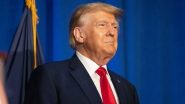New Delhi, Dec 26 (PTI) With global supply chains continuing to shift in India's favour as the world's largest businesses strike a new balance between resilience and efficiency, manufacturing has the potential to transform the country's economy, Tata Sons Chairman N Chandrasekaran said on Thursday.
In his New Year message to employees of the salt-to-software conglomerate, Chandrasekaran termed it as "a new manufacturing golden age for India" and said he was looking ahead to 2025 "with a sense of hope and optimism" after 2024, a year marked by the loss of Tata Group Chairman Emeritus Ratan Tata.
"While AI-led breakthroughs in healthcare and mobility can help the whole of humanity, manufacturing has the potential to transform our economy in India," he wrote.
Elaborating, he said, "Global supply chains continue to shift in India's favour as the world's largest businesses strike a new balance between resilience and efficiency. What might have seemed like a short-term reaction to the pandemic has proved much more enduring."
Amid relentless geopolitical instability, Chandrasekaran said, "The equation has tilted firmly toward resilience and India, with our vast talent pool and growing manufacturing capacity, is poised to benefit."
Reiterating Tata Group's plans to create 5 lakh manufacturing jobs over the next half decade, he said these will come in part from investments in facilities across India's "factories and projects that will produce batteries, semiconductors, electric vehicles, solar equipment and other critical hardware destined to play a central role in the economy of tomorrow".
He said ground-breaking ceremonies and construction began at over seven new manufacturing plants, including India's first semiconductor fab in Dholera, Gujarat, and a brand new semiconductor OSAT plant in Assam.
"There is the electronics assembly plant in Narasapura, Karnataka, an automotive plant in Panapakkam, Tamil Nadu, and new MRO facilities in Bengaluru, Karnataka," Chandrasekaran said.
He further said, "We also have new battery cell manufacturing factories in Sanand, Gujarat, and in Somerset, UK. We inaugurated the C295 final assembly line (FAL) in Vadodara, Gujarat, and began solar module production in Tirunelveli, Tamil Nadu."
The five lakh new jobs will be "in addition to the many services jobs we expect to introduce across retail, tech services, airlines, and hospitality, among other sectors".
"Such moves are exciting for our group and for India, but more importantly, they give hope to the one million young people who enter our workforce each month. Thankfully, manufacturing has powerful multiplier effects; indirect employment opportunities from sectors such as semiconductor manufacturing are substantial," Chandrasekaran noted.
"It is with a sense of hope and optimism that I look ahead to 2025. India's economy is strong and the great trends of the age are in our favour," he said.
He further said, "In this new technological age, and this new era of Indian manufacturing, our enormous pool of young talent will not only contribute to our nation's future, they will build it, literally, with their hands and with their minds."
Reflecting on 2024, he said it was an "unpredictable year" that was defined globally by geopolitical instability and a slight brightening of the macro-economic outlook.
"Military conflicts in Ukraine, Gaza, and Sudan raged on, exacerbating humanitarian crises in Europe, the Middle East, and Africa. We also witnessed citizen-led movements in Bangladesh and South Korea," he noted.
As the year draws to a close, Chandrasekaran said, "Political changes and disruptions continue to shape domestic and foreign policy, especially with regards to immigration, technology and global trade. Tariffs are once again at the forefront of leaders' minds."
He further wrote, "But aside from these momentous global events and trends, 2024 will always hold a deeper and more personal resonance for me and for everyone associated with our Group. This was the year we lost Mr Ratan Tata -- a man whose personality, integrity and strategic vision shaped our business for a generation."
In an emotional note, he said, "Though it is difficult to begin a new year without Mr Tata, there is comfort in knowing that the business he devoted his life to continues to thrive. Big strategic bets, made with his encouragement, are bearing fruit, particularly in hi-tech industries and manufacturing where our footprint continues to expand."
In his note, Chandrasekaran said there has been "a science and technology role reversal".
"Let's begin with AI and technology. A fundamental reversal is taking place. Historically, scientific progress has predominantly fueled technological progress. Consider how breakthroughs in quantum mechanics led to the digital age," the Tata Sons Chairman said.
Today, however, the opposite is happening: advancements in technology are leading to scientific discoveries.
"This year the Nobel Prize for chemistry went to developers of an AI model that predicts protein structures -- a glimpse of how computational tools will revolutionise drug discovery," he said, adding that previously, determining the 3D structure of a single protein typically took a year or more. Now AI tools can predict these shapes with remarkable accuracy in minutes.
"AI can transform healthcare in other profound ways, not only enhancing how we understand and treat diseases but also how we diagnose them. Machine learning is being used more in environmental research, while large language models hold the potential to significantly expand access to clinical care," the Tata Sons Chairman said.
He further said, "We will continue to see significant acceleration in the use of AI in fields like healthcare and mobility."
(This is an unedited and auto-generated story from Syndicated News feed, LatestLY Staff may not have modified or edited the content body)













 Quickly
Quickly
















